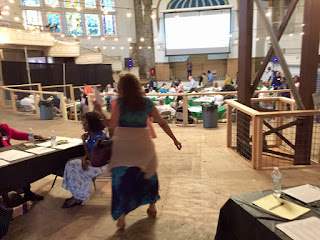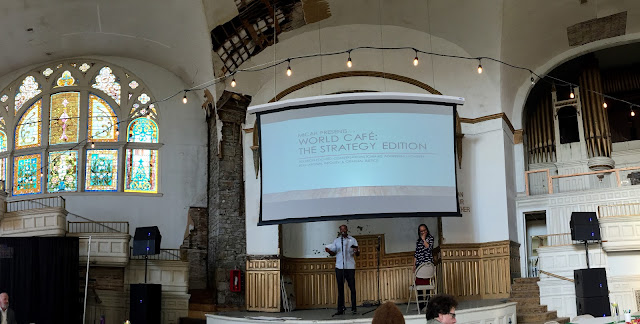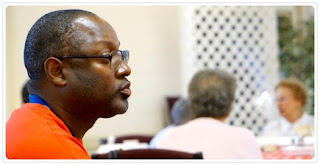My first experience with the disability rights group ADAPT
By Timothy Redd
From March 13th through the 18th I was in our nation’s capital participating in ADAPT’S Spring Action.
What is ADAPT?
ADAPT is a national grass-roots community that organizes disability rights activists to engage in nonviolent direct action, including civil disobedience, to assure the civil and human rights of people with disabilities to live in freedom.
On Sunday, May 14, I attended a morning meeting informing me about the rules and procedures of an action, the history and many victories of ADAPT. Everyone learns about how to be involved in non-violent civil disobedience.
We lined up and took to the streets marching together to Upper Senate park for the annual ADAPT Fun*Run for Disability Rights. It's a time where everyone wheels or walks laps for sponsors who have donated to this cause.
There were speeches, fellowship, and lots of meeting and greeting. We also honored women and our mothers this Sunday in a very moving bit of theatre.
The second day, Monday, May 15, we marched to the White House as people chanted with us and applauded. I was touched when a saxophonist played “We shall overcome” as we passed by. We protested at White house demanding the Trump administration:
- Publicly acknowledge that the Americans with disabilities are being denied their Constitutional rights to life, liberty and due process when they are denied Medicaid Long Term Services and Supports and forced into nursing facilities and other institutions;
- Demonstrate support for the Liberty of disabled Americans by advancing proposals that promote their community integration, such as Independent Living, MFP and Community First Choice.
- Issue a statement that the President and his administration support the Disability Integration Act, bipartisan legislation that ensures no disabled individual is denied their Constitutional right to liberty by requiring people with disabilities be provided a community-based alternative to institutional placement that allows them to lead an independent life.
- Designate Ivanka Trump as the Trump Administration’s “Ambassador for the Disability Community” and, during the next year, send her to visit ten model programs for transitioning people with disabilities into the community, convene round-tables in ten states to support them in developing effective systems for truly integrating people with disabilities, and work to advance the Disability Integration Act; and
- Convene a meeting between the Disability Community – represented by ADAPT and the members of the National Disability Leadership Alliance – and key officials in the Trump administration, including the Secretary of Health and Human Services, the Secretary of Housing and Urban Development, the Department of Labor and the US Attorney General to end the forced institutionalization of disabled Americans.
The second day of Action took ADAPT to the FDA White Oak Campus in White Oak, Maryland. Activists demanded that Scott Gottlieb, the FDA Director, immediately stop the torture of disabled Americans by finalizing the FDAs proposed rules banning the use of shocking devices. Over 80 ADAPTER’S were arrested at this site as well.
The United Nations has condemned as torture the use of “aversives” on disabled people who are forced to attend the Judge Rotenberg Center (JRC) in Canton, Massachusetts. ADAPT held a protest last October in which over 200 advocates occupied the entrance to the JRC. ADAPT is known for its work to end institutionalization and its promotion life in the community and its leadership see this as part of that larger project.
“We cannot stand idly by while our brothers and sisters at the Rotenberg center are tortured right here on American soil,” Said Bruce Darling an organizer with ADAPT. “No person should be tortured just because they are disabled, which is what the FDA is allowing by refusing to ban these devices!”
The so-called ‘aversives’ that JRC uses include painful electric shocks from a device more powerful than a police taser, to control disabled people's behavior and punish them for something as small as getting out of seat without permission. Jennifer Msumba, a JRC survivor, has called the shocks “a stinging, ripping, and pulling pain that froze time.”
In 2014, the FDA proposed regulations which would ban the use of these electrical shock devices. The FDA has failed to finalize the rule, however, despite significant public comment from the disability community.
Our final day of action ended with direct grassroots support for disability rights. In order to rally your elected officials sometimes you have to meet them on their territory. I talked to Bob Corker’s, Steve Cohen’s, and Lamar Alexander’s staff. I asked them to support the Disability Integration Act (DIA) Senate Bill S 910 and House Bill HR 2472.
Attending an ADAPT action is a life changing experience. People with disabilities took over the city and let everyone know that disability rights are civil rights; especially elected officials.
Anytime you are different in the world, it's a fight. To see an entire community of people with disabilities having a good time and supporting each other really is affirming to me. We are meant to be whom we are. Human rights are disability rights. There is much work to be done to reach liberation for all people and there is equality for all.
There is something we can all do to help humanity. We can write senators and representatives. We can donate, volunteer, speaking up, help out, giving back, or march in the street.
Good work is just good work. I have to say I had many reservations about going to an action. Action days are grueling and it’s no way to describe an ADAPT action. I enjoyed meeting so many people and also talking to congressional and senate staffers the most.
The biggest surprise in all for me was how well the actions are organized with safety being a chief concern and that I manually pushed myself for miles all across DC.
One event stands out; as I was in the Rayburn building, I looked down the hall and I saw Congresswoman Maxine Waters. It was a pleasure to talk to her and get a picture as well.
We the community of people with disabilities are powerful when we come together and there is no greater testament of that power until you experience an ADAPT party. To see so many enthusiastic people fighting for our civil rights was humbling, eye opening, and exciting.
To learn more about ADAPT you can access the official website at adapt.org. If you interested in becoming a member of ADAPT or learning more group meetings are held every Friday here at MCIL at noon.











